10 Tips for Wearing Sunglasses Over 60 From Stylists and Eye Doctors
Protect your vision and your image in one perfect purchase.
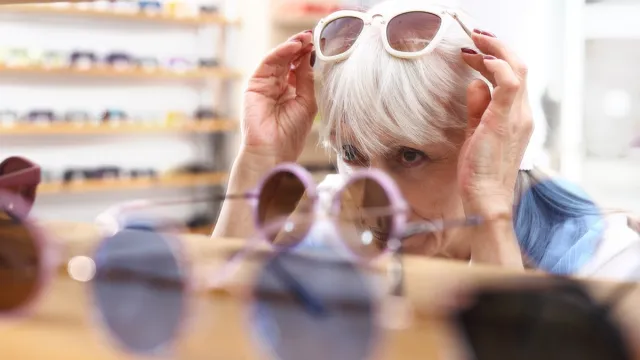
If you've noticed your eyesight worsening in your 60s, you're not alone—it's common to experience age-related vision changes. According to the American Academy of Ophthalmology (AAO), one of the best ways to preserve and protect your eyesight is to get regular eye exams with an ophthalmologist. However, there are steps you can take between your doctor visits to enhance your eye health, and protecting from sun damage is among the top priorities.
"As we mature, our eyes become more susceptible to sun damage, making sun protection even more crucial," says Jovi Boparai, MD, an ophthalmic surgeon and the CEO and co-founder of CorneaCare. By wearing the right pair of sunglasses over 60, you could just be saving your sight.
From choosing the right shape to nailing just the right color for your complexion, the above-60 crowd can also benefit from some age-specific style tips, fashion and image consultants say.
Looking for the best sunnies to suit your senior years? Don't buy your next pair before reading these doctor- and stylist-approved tips.
RELATED: The 5 Best Sunglasses for Your Eyes, Doctors Say.
1
Don't equate tint with UV protection.
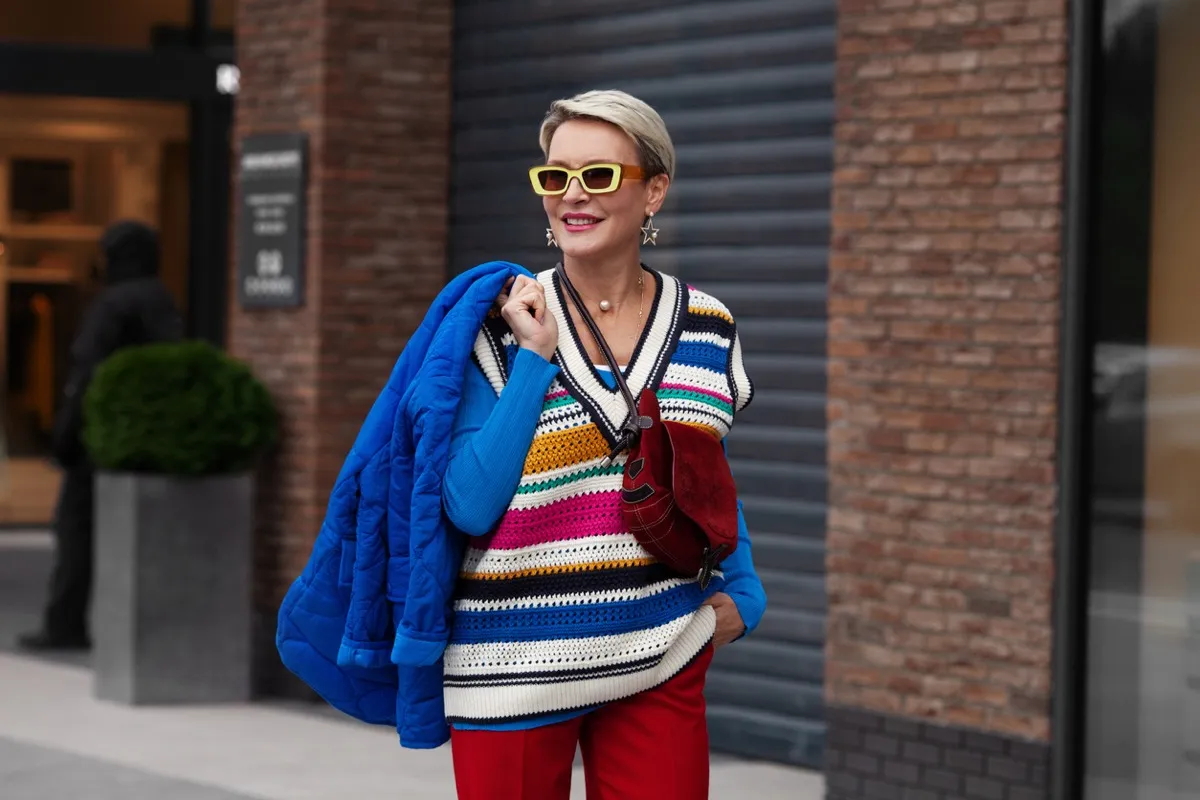
One of the biggest mistakes seniors make when selecting sunglasses is assuming that those with a dark tint have adequate UV protection.
"UV is not tint—UV protection can be clear," says Bridget Anderson, OD, an optometrist and content creator who goes by Bridget the Eye Doctor on social media. "Some of you might have UV protection on your regular, clear glasses, and a lot of you probably have sunglasses that are super tinted that have no UV protection," she said in a recent TikTok post.
Anderson explains that this can harm your eyes because when you wear tinted lenses without UV protection, your pupils dilate, letting in more UV light. "By wearing the wrong sunglasses, you can actually cause more damage to your eyes than if you wear no sunglasses at all," she warns.
RELATED: 6 Expert Tips on Getting Sun Without Aging Yourself.
2
Consider color.
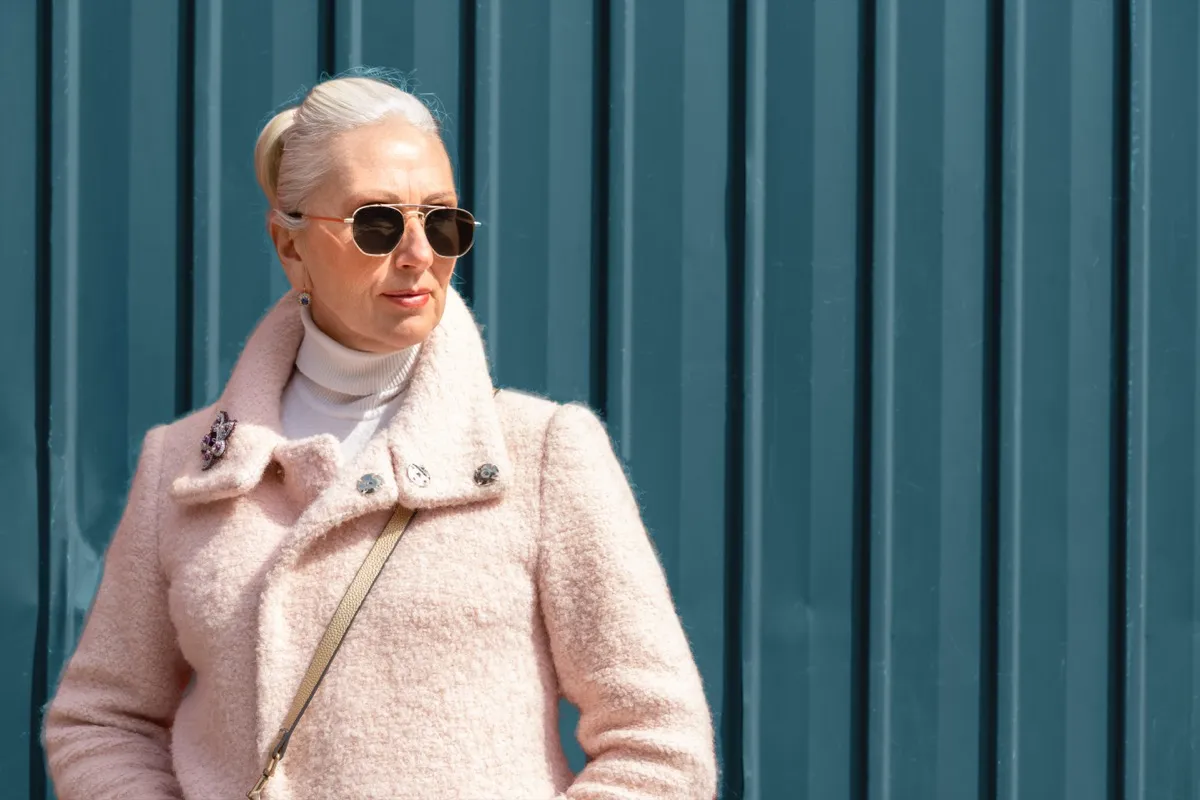
Fashion stylist and image consultant Elizabeth Kosich says you'll next want to consider the color of your frames, taking any recent changes in your hair color or skin tone into account.
"When choosing sunglasses, harmonize frame to hair color for the most flattering effect," she says. "Dark hair is best with dark or metal frames, and light hair is best with transparent or light frames. Consider undertone too, matching warm skin tones to gold and cool ones to silver or gunmetal."
3
Find your perfect shape.

When looking for perfectly shaped sunglasses, you should think first about the shape of your face, Kosich says. And keep in mind: What worked for your face shape 10 years ago may be in need of an update. "Sunglasses should complement your face shape, not reinforce it," the stylist tells Best Life.
"If your face is round, opt for thinnish wire frames with squarish edges to balance out all the roundness. Rectangular-shaped faces should wear oval frames to add width and curves, and square faces should opt for roundish frames to soften all the angles. Heart and diamond shapes looked great in frames with swept-up corners, and oval faces can wear anything," she says.
Kosich adds that you shouldn't be afraid to make a statement at any age, as long as you know what statement you're making. "Above all, know the message your sunglasses are sending. Frames with squared, sharp edges communicate power and authority, while countered lines project a softer image that reads as approachable and trustworthy," she notes.
RELATED: 17 Surprising Things That Are Damaging Your Eyes.
4
Consider an anti-reflective coating or polarized lenses.
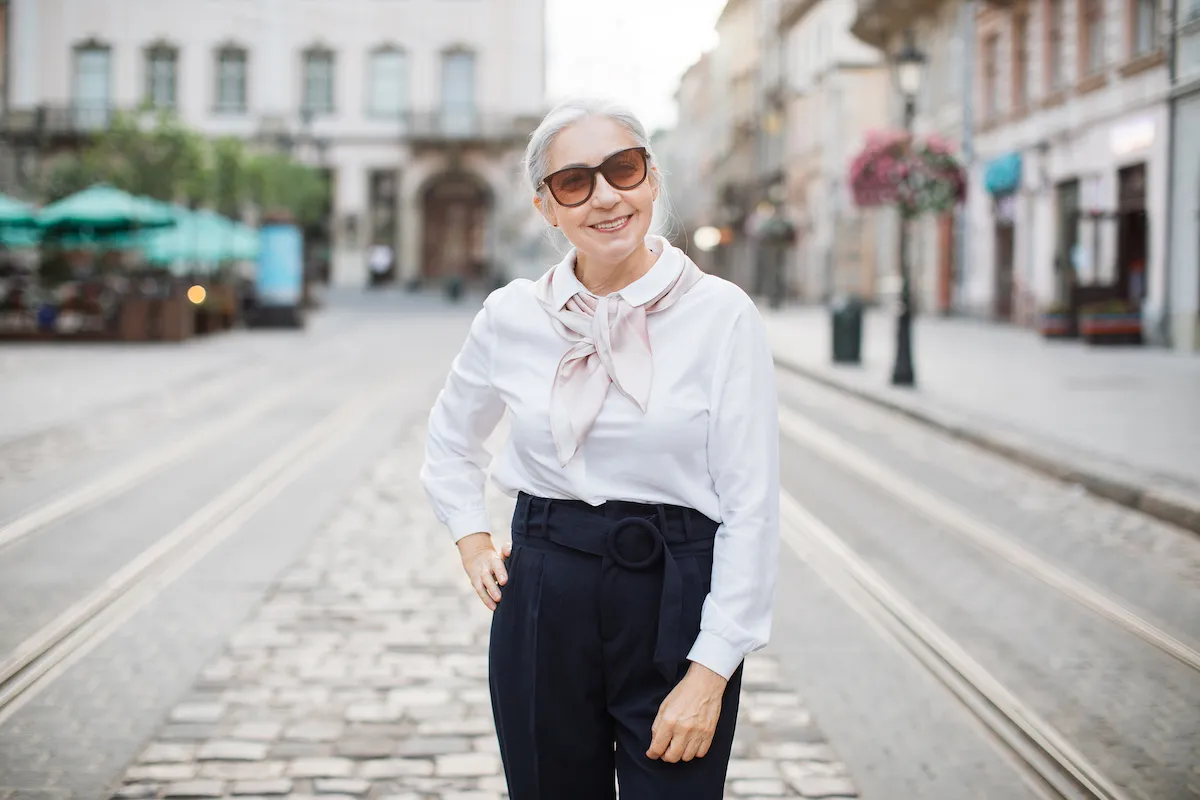
According to the AAO, many seniors—especially those with age-related macular degeneration (AMD)—may experience increased sensitivity to glare and bright light. Buying sunglasses with an anti-reflective coating can reduce glare, protecting and preserving your vision.
Boparai recommends buying pairs that have anti-reflective coating on both sides. "This minimizes glare bouncing off the back of the lenses, improving comfort and vision clarity," he notes.
"Similarly, polarized lenses reduce the amount of light that comes in through the glasses, which can help lower glare coming off reflective surfaces like water or pavement. Wearing them can help improve clarity and visibility," the AAO says.
5
And consider photochromic lenses.

If you already wear prescription eyeglasses, remembering to bring a second pair for bright days can be a hassle. People also tend to underestimate how much UV protection they need, neglecting to wear sunglasses on cloudy days, when protection is still necessary.
Boparai says that bifocal or progressive lenses in your sunglasses can be a convenient option that removes the guesswork. "Consider photochromic lenses that adapt to light changes, offering sun protection outdoors and comfort indoors," he recommends.
RELATED: How Your Eye Color Affects Your Reading Ability, New Study Finds.
6
Keep your prescription in mind.

In some cases, the particulars of your prescription may influence the frames you choose, Anderson says in another video. She notes that if you have a prescription above or minus four; if you need progressive, bifocal, or trifocal lenses; or if you have very different prescriptions in each of your eyes, your prescription may factor in significantly.
As an example, she explains that people with a higher prescription may want to opt for smaller frames, to counteract thicker, heavier lenses. "The bigger the frame you get, the more problems or potential negatives you're going to have. The bigger the frame you get, the thicker the edge will be… and the heavier it's going to be." She warns that in this case, going with larger frames may result in a "bug eye magnification Coke bottle look."
She recommends checking in with your doctor to find out how your specific prescription might influence your prescription sunglass purchase.
7
Find a suitable frame size.

Choosing the right size frame is another way to ensure that your sunglasses enhance your look, rather than overpower it.
"Make sure they fit your face," says Reginald Ferguson, a men's fashion consultant and the founder and owner of New York Fashion Geek. "The width shouldn't go over your temples," he says.
RELATED: What Happens If You Fall Asleep With Contacts In, Doctors Say.
8
Don't rely on sunglasses alone.

Sunglasses are an excellent tool for protecting your eyes, but experts say it's important not to rely on them alone for sun protection.
Elizabeth Shanika Esparaz, MD, an ophthalmologist and medical retina specialist, recommends also wearing broad-brimmed hats and avoiding sunlight during peak hours. She notes that sun exposure can contribute significantly to your risk of developing cataracts, or clouding of the eye lenses.
"People over age 60 usually start to have some clouding of their lenses. However, vision problems may not happen until years later," the AAO notes.
9
Always check the labels.
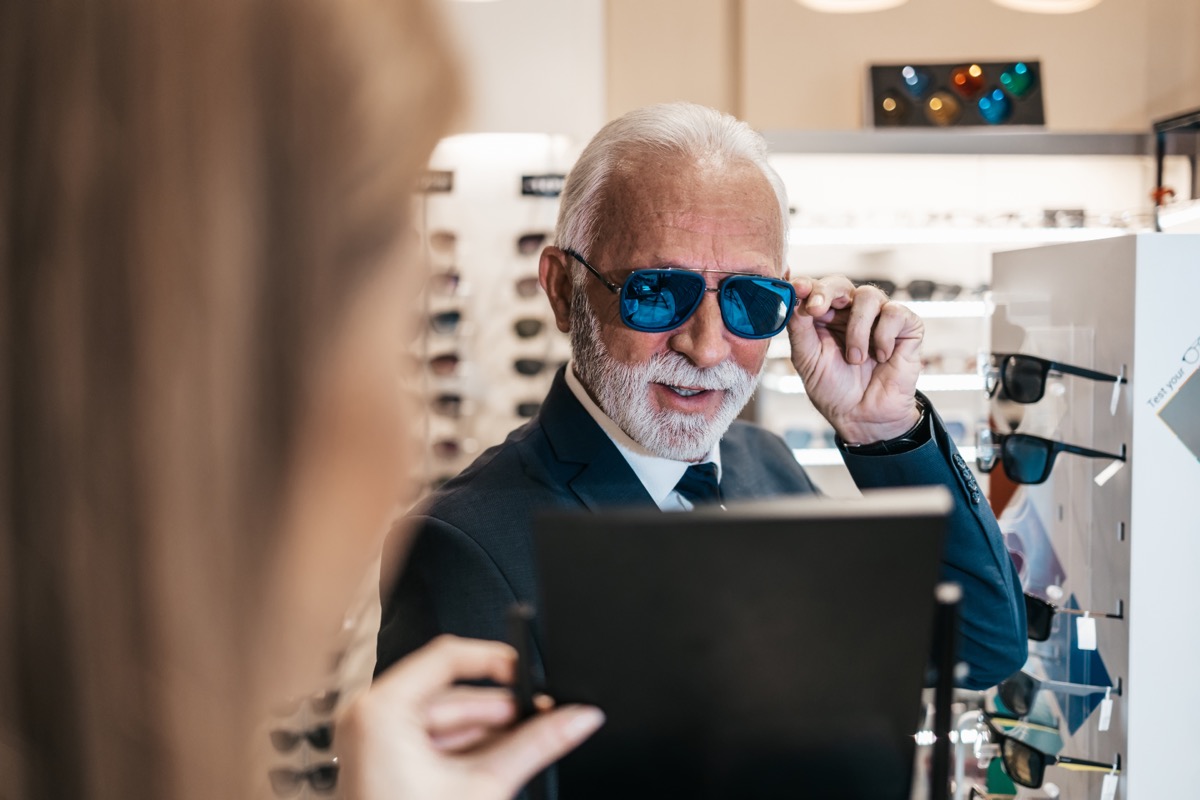
Because you can't gauge UV protection by the visible features on your glasses, it's important to always check the label to assess safety. According to Boparai, your sunglass labels should say they have "UVA/UVB protection" or "100% UV absorption."
"This shields your eyes from harmful rays that can contribute to cataracts, macular degeneration, and other eye problems," he tells Best Life.
10
Step away from the bargain bin.
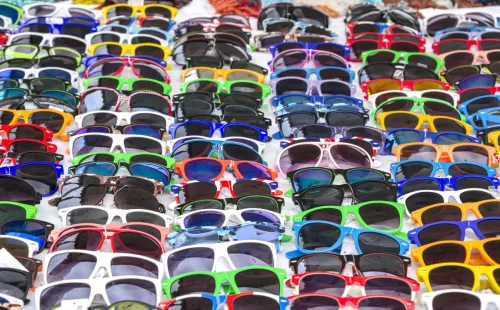
According to eye care experts at MyEyeDr., it's also best to steer clear of the bargain bin, instead buying your sunglasses from trusted vision care providers with in-house optometrists. They note that it's never worth it to save a few dollars if the sunglasses you buy fail to meet your eye care needs.
"Don't sacrifice quality for cheap deals," Boparai agrees. "Invest in good quality sunglasses with proper UV protection and durable materials. Your eyes are worth it!"
Best Life offers the most up-to-date information from top experts, new research, and health agencies, but our content is not meant to be a substitute for professional guidance. If you have health questions or concerns, always consult your healthcare provider directly.





















